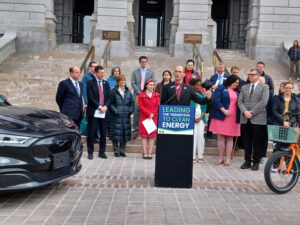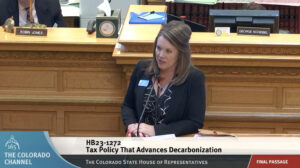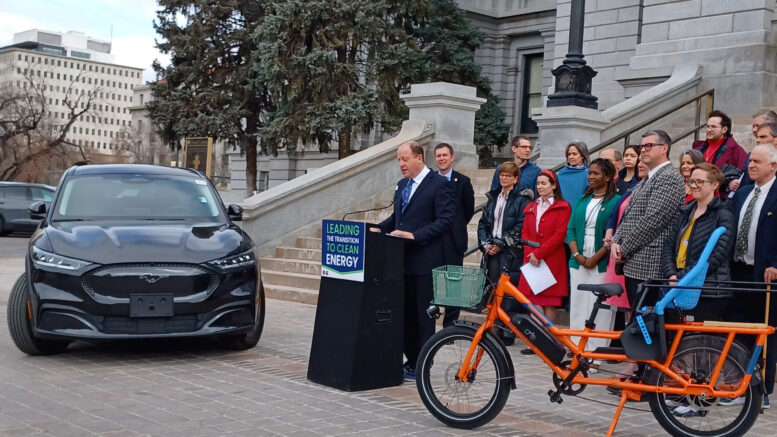Colorado’s twin pushes for greater adoption of renewable energy and faster reduction of greenhouse-gas emissions now feature a bevy of new incentives, though those come partially at the expense of tax credits for the oil and gas industry.
Gov. Jared Polis on Thursday signed into law House Bill 1272, a wide-ranging offering of tax policies with a shared goal of decarbonization. Standing beside the bill’s sponsors, the Democratic governor inked the measure at Colorado Cycling Company in Aurora just three days after the close of the 2023 legislative session.
The green-energy bill, sponsored by Democratic Reps. Mike Weissman of Aurora and Junie Joseph of Boulder, got a bit of a haircut as it moved through the legislative process but still is expected to dole out some $77.8 million in new tax credits during the fiscal year that begins in July 2024. When Polis and legislators rolled the proposal out in early March out as a package of clean-energy bills, the governor said that the tax breaks both will help the state reach its goal of net-zero emissions in the electric grid and give people an alternative to volatile natural-gas prices.
However, the tax expenditures will be offset partially by a reduction in the ad valorem tax credit that oil and gas producers can claim against real property taxes they pay to local governments — a credit meant to balance the costs of drilling in areas with high and low property taxes. That reduction — from 87.5% currently to 75% in 2024 and 2025 and to 65.625% in 2026 – is expected to cost those companies more than $28 million per year.
A range of green-energy tax breaks

Colorado state Rep. Mike Weissman offers details in March of what was then a $100 million green-energy tax-credit bill.
The largest tax incentives in the package will go to efforts to electrify the transportation system. The bill boosts Colorado’s current $2,000 electric-vehicle tax credit to $5,000 on July 1 and extends its end date from 2025 to 2028, though the value of the credit diminishes over time. HB 1272 also includes credits for electric and plug-in hybrid electric trucks that reach as high as $12,000 and e-bike tax credits of as much as $500.
Just behind those e-vehicle credits in terms of total spending, though, are industrial clean energy tax credits — refundable state income-tax credits equal to 30% to 50% of qualifying expenditures to implement greenhouse-gas emissions-reduction improvements. The credits also can cover up to 30% of the cost of emissions studies industrial facilities can do to determine the best improvements, and the bill sets aside $16 million a year for the years 2024 through 2028 and $24 million annually for 2029-32 for the industrial sector.
Other offerings include a credit of 3 cents per kilowatt hour, up to a maximum $1 million per year, for entities that produce geothermal electricity for sale or their own use, plus a credit of as much as $5 million for expenses of evaluating and developing geothermal energy resources. And HB 1272 features new credits for production of sustainable aviation fuel and for the installation and development of heat pumps.
“We use the tax code to incentivize and encourage things we believe are needful,” Weissman told the House Energy and Environment Committee during a hearing on the bill on April 6. “In this case, we do have an ongoing need to squeeze more carbon out of just about every sector of our economy.”
Reducing oil-and-gas tax break
However, both oil-and-gas companies and Republican legislators questioned why the bill needs to squeeze ad-valorem tax credits in order to get some of its incentive funding.
HB 1272 originally proposed dropping that tax credit to 65.625% from 2026 through 2032, but that was amended back to offering that lowest tax-credit amount just in 2026. A working group is studying Colorado’s severance-tax system and expects to have a recommendation on how to deal with that issue going forward by that time, noted Kait Schwartz, director of American Petroleum Institute Colorado.
Weissman emphasized that Colorado, for many years, has had the second-lowest effective severance tax rate, 1.5%, in the West, and that he considers the new rate to be not that big of a change. The tax-credit reduction is very much in cognizance to what is being discussed in the severance-tax working group, and there is a “pretty broadly held” concern about how the state administers property tax in this area, he said.
“Robin Hood in reverse”

Colorado state Rep. Brandi Bradley speaks on the House floor in April against a bill offering a menu of green-energy tax breaks.
However, House Republicans argued that the change is significant, particularly as the bill that put together the working group said that any changes to the severance tax should be revenue neutral. Rep. Brandi Bradley, R-Littleton, questioned the use of taxpayer funding to offer breaks for purchasing new electric vehicles that often cost more than the average annual salary in the state (though the bill does not allow such breaks for any vehicles costing $80,000 or more).
“In this case, it’s Robin Hood in reverse,” Bradley said during debate in the House, which passed the bill on a largely partisan 43-20 vote before clearing the Senate on a completely partisan tally. “We take from the lower and middle class to subsidize the upper class.”
Polis has until June 7 to sign or veto bills passed during the 2023 legislative session.
